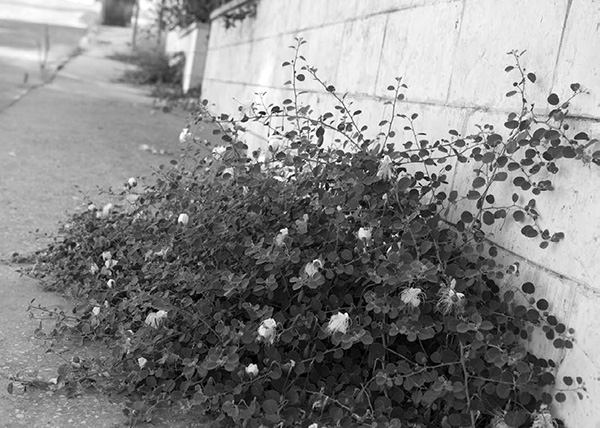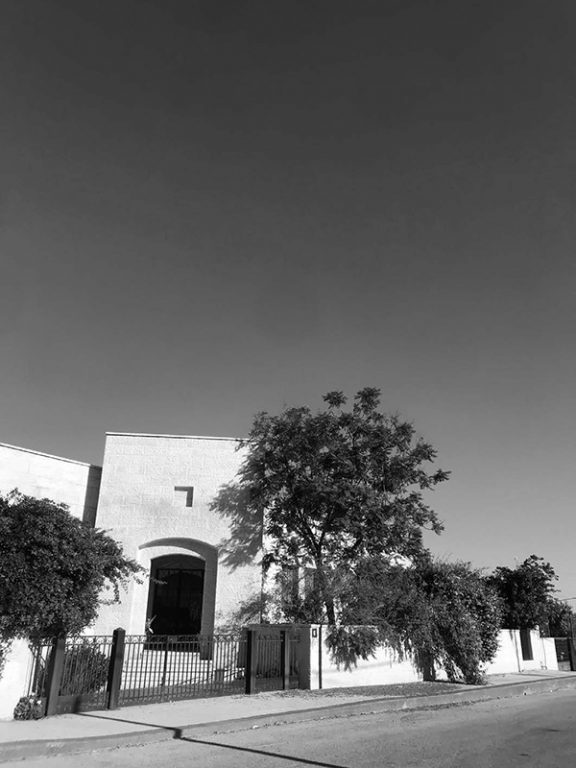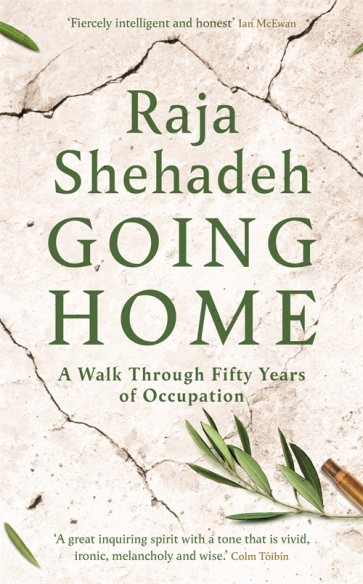The streets are clogged with traffic as people rush back home before the evening call to prayer that indicates the end of the day’s fast. Some are just cruising around, exhibiting their new cars bought with loans from the bank, playing loud music. Such a cacophony. There is too much light to be able to see the stars. I try to remember how it used to be when I walked home with my grandmother from the Grand Hotel. Then there were few street lights, many broken by bored children throwing stones, competing over who had the better aim. The stars would be visible and there would be almost total silence, with only the occasional car passing. As we walked home together I could hear our footsteps and the click-click-click of Tata’s wooden cane on the paving stones.
‘Muffle up. We don’t want your tummy to get cold,’ she would say as we struggled against the wind from the distant Mediterranean coast that always hit us as soon as we turned the corner from Main Street to Ahlia Street.
I walk faster, trying to make it home before dark, thinking how the city I grew up in has remained with me. I am able to see both the old and the new, how it was and how it has become. When I was younger I was unable to see myself the way people saw me. I looked at the older people around me and felt dismayed at how they had aged. Now that I have neither ‘youth nor age’, I feel more tolerant and loving. I only hope that the time will come for me, as it did for poet Derek Walcott:
when, with elation
you will greet yourself arriving
at your own door, in your own mirror
and each will smile at the other’s welcome.
I used to believe that as I walked among the people of my city I was mysterious, an enigma. I wondered what they made of my often shabby dress and manifestations of rebellion. I don’t any more. I think they always knew me, perhaps better than I knew myself. They read me like an open book. My family is known, my lineage, my history, my capabilities and failures – though perhaps not so much through what has meant the most to me, my writing. For the others I was only the lawyer. For many years Al Haq, which has become a well-respected public institution, was associated with my name, but that was mainly for an earlier generation.
And yet even though I have lived all my life in the same small city, I have never felt at ease with the society or truly a part of it. I was always at odds with the tradition, a rebel, even when I yearned to belong. I always was, and will remain, an outsider. This may be why I’ve continued to be troubled by a recurrent dream of searching for a home.
This feeling of being a stranger was shared by my maternal grandfather, Boulos Shehadeh, the poet, who towards the end of his short life published a poem called ‘despair’ in which he wrote:
The time of departure is nigh
who will have tears to shed for me?
I’m but a stranger in these lands who has outstayed his time
As I approach my house, the shadow following me lengthens as the sun begins to set on my city. Thomas Gainsborough, the British portrait and landscape painter, thought that all landscape was light and shadow. I wonder how this applied to writing. With my words I have tried to shed light on my city. As I move closer to home, my own shadow diminishes, so that by the time I arrive it has disappeared altogether. I am struck by the thought that when I’m gone not even my shadow will remain.
Before opening the gate, I look at my house with the soft rosy light of the setting sun striking the limestone walls. The feathery leaves of the jacaranda in the garden hug the walls and shed their shadows over the entrance I am now approaching. Our house is rather grand, I think, and turned inward. I have never looked at it this way before. Now I can see how like me it is. This is how I survived in my society with its inflexibility and constant failures and retreats: by being like the house – walled, stubborn, centred, inward-looking, impregnable, with a mind of my own and my own peculiar ways. I wanted to escape my predicament, find consolation in abstraction and turn suffering into art.
Near the kerb, a short distance from the entrance, I notice the caper plant that I had looked at on my way out this morning. I see that its pods have opened. This bushy plant is growing out of bare rock yet it flourishes, even without water. Its round alternate leaves, thick, hardy and shiny, are mauve in colour. And among them the most beautiful flowers are blooming, composed of delicate pink-white petals and long violet stamens, with a single stigma rising above the stamens, all surrounded by four sepals waving gently in the slight breeze. Such a refreshing sight in these dry hills. No gardener has cultivated this bush. And perhaps, except for the spikes with which the plant protected itself, it might have been pulled up and destroyed. Needing little organic matter to grow and able to withstand high temperatures, this delicate but hardy shrub has established itself in these hills. It is capable of surviving in tough conditions, producing luscious fruit in many different places around the world. I would like to think of myself in those terms.
I am about to open the gate and enter the courtyard that leads to our main door, when I briefly glance back at the hills that can be seen beyond the empty plot between the buildings across the street. They look almost pink as the limestone reflects the setting sun. I want to linger and hold on to this day, another good day in the short time that is left to me.
The dark purple of the bougainvillea is clashing with the setting sun. The plumbago is in full bloom. Neither in the first family house nor at Helen’s did I have a garden that did so well. It is only in this house that I managed to create such a satisfying one.
I linger a bit longer outside the gate until the sun has gone and the moon is visible. I can see the solanum with its blue flowers closing for the night. From the house I can hear a Handel opera that Penny is listening to. I decide to wait for the aria to finish before proceeding. I may have missed out on many pleasures because of my physical vulnerability, but I have other satisfactions. A fragment of Wordsworth’s ‘Tintern Abbey’ comes to me:
. . . wild ecstasies shall be matured Into a sober pleasure; when thy mind
Shall be a mansion for all lovely forms, Thy memory be as a dwelling-place For all sweet sounds and harmonies . . .

The gate clicks shut behind me. I recall doing the same before the 2002 Israeli invasion of Ramallah. Then I was coming back home with supplies from the market. Once inside my house, I fantasised that I would be safe, that it could not happen to me. I had been going on with my life, trying to remain out of sight, keeping to myself, stirring as few ripples as possible, convinced that the soldiers wouldn’t enter my house. Faced with external danger, isn’t this what most people tell themselves? Not me. It’s the others. Don’t see me. Don’t come to me. Leave me alone. I’m innocent. I’m not like the others. The alluring illusion of invisibility!
The next day, they came through this very gate that I’m now entering, six of them, six fully armed Israeli soldiers without any sort of warrant. I was not immune. Of course not. The invasion was a real awakening. And they may well come again, and this time not only to enter and search but to do more. They could destroy the house. For the last fifty years they have been destroying thousands of Palestinian homes. By hoping against hope that I would be spared, I was choosing to forget that the policy is indiscriminate. I, a Palestinian, am always subject at any time to the whims of any Israeli soldier.
For fifty years I’ve been possessed by that feeling of insecurity whenever I come back to my house. Will this precariousness ever come to an end? Nothing lasts forever: not this occupation or these turbid murmurings of my heart. The day will surely come when I will be free of apprehension. Yet for now I needn’t dwell in fear, for at long last I have found what I was searching for, my home, and no one can take it away from me.

Penny is still in her study. She has turned on the side lamp with the blue painted shade and it lights up the colourful, life-affirming painting by Samia Halaby that we had carefully chosen when we first came to live in this house. I can smell the dish she is preparing for dinner. The table with the ceramic top in the courtyard is already set. I’ll do my part for the meal and we’ll sit outside under the lemon tree and eat.
I go to wash my hands before dinner and take a look at my face in the mirror. I find that I am able to smile back at the image I see.
I leave the bathroom and go out into the courtyard. On the stone wall are the mottled shadows of the branches of the lemon tree we planted in the middle that has now matured into full height and is laden with yellow fruits.
I look around me at our intimate surroundings and now call out to Penny, ‘I’m home.’

All images courtesy of the author.







